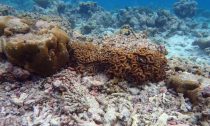
More than half of the spectacular and remote coral reefs beyond the boundaries of the Great Barrier Reef suffered severe bleaching this summer, an underwater scientific expedition has found. Several reefs in the vast Coral Sea marine park known among divers for their arrays of corals, large fish and precipitous drop offs into the deep ocean suffered extreme bleaching. Scientists from James Cook University’s ARC Centre of Excellence for Coral Reef Studies recorded the bleaching on the reefs that are more than 200km offshore during dives in February and March.
Some reefs had 90% of their shallow water corals bleached – an extreme level likely to lead to deaths of many corals, said Prof Andrew Hoey, a co-ordinator of the expedition.
Hoey said: “It’s becoming too familiar to jump in to t...
Read More












Social Profiles